KUALA LUMPUR: The Ministry of Defence is set to develop a new contract monitoring system to enhance efficiency and transparency in managing asset and project procurement.
Deputy Defence Minister Adly Zahari announced the move following findings in the Auditor-General’s Report (LKAN) 2/2025, which identified weaknesses in enforcing contract terms, particularly regarding late penalties.
Under the current system, penalties for delays are only imposed when extension of time (EOT) applications are reviewed, even though enforcement could occur earlier.
Adly explained, “An EOT should come with two scenarios — either with or without a late penalty.
“Sometimes EOT is granted without a penalty due to technical issues... but I believe if an EOT is to be granted, we can enforce it with a penalty.”
The ministry has already taken action against delays in the delivery of 68 Gempita armoured vehicles and two non-armoured type B vehicles between 2020 and 2023.
A late penalty notice of RM162.75 million was issued on Jan 15 to the supplier, who later appealed for a waiver citing force majeure due to the COVID-19 pandemic and the Russia-Ukraine conflict.
Adly stated, “The appeal was presented at the Contract Coordination Panel (CCP) meeting on May 6 and it was decided that the company would be subjected to the full late penalty of RM162.75 million.”
Additionally, the ministry is recovering RM53.93 million from the performance bond and will claim the remaining penalty through set-off or direct collection.
Regarding procurement via the ‘breakdown’ method involving RM107 million, Adly clarified that logistical challenges and varying technical expertise necessitated the approach.
“Our assets are located in places like Kota Belud, Sabah, and Port Dickson and Gemas in Negeri Sembilan, among others. That is why in this breakdown approach, we took into account those aspects, as well as the readiness of the assets,“ he said.
The new monitoring system aims to streamline contract enforcement and ensure timely project completion while safeguarding national security interests. – Bernama









